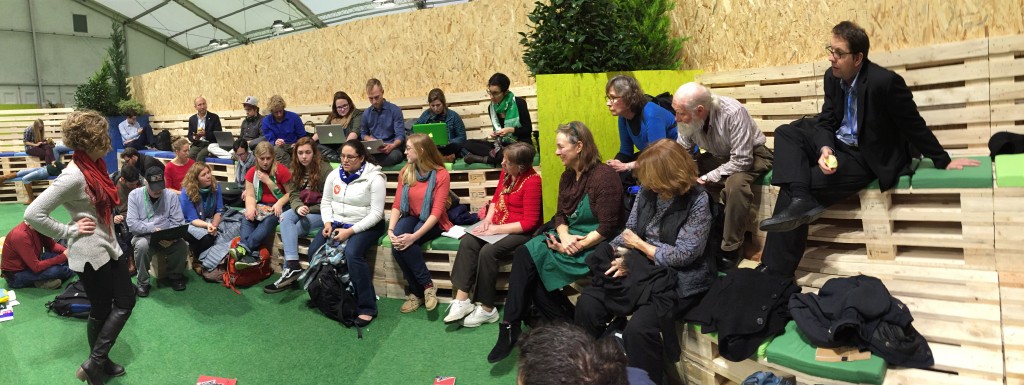Today was my travel day back to the United States. It was also the day that the final draft of the Paris Agreement was to be released — and the day thousands of climate activists had vowed to flood the streets of Paris in defiance of a ban on demonstrations by the French government — both happening around noon. With my flight from Paris to New York leaving at 10:30 a.m., I was in the air for nine hours, plus an additional six hours due to changes in time zone – putting me out of communication for a crucial 15 hours.
Fortunately I was able to upgrade to business class for the long flight, which meant I could actually sleep a few hours after staying up very late packing, But by the time I landed in New York at 8 p.m. Paris time, 2 p.m. local time, I was desperate for information. My friends on social media were only too happy to supply it. The negotiators at COP21 had reached an agreement — by most accounts a good one. The French government at the last minute had issued a permit to climate activists. My feed was flooded with stories and analysis about the historic Paris Agreement, my email was overflowing with reactions from NGO groups, and my friends were posting photos and videos from the day’s events.
The photos and videos from the demonstrations organized by 350.org and others are amazing, and remind me of the 2014 People’s Climate March in New York City. I am so glad that the French government finally came to its senses and allowed people to express themselves. Perhaps they had no choice, as literally tens of thousands of activists were in the streets, and there would be no way to arrest even a small percentage. Perhaps this chain of events shows people like Naomi Klein know more about activism than I do. When she urged people to take to the streets in mass numbers, they did, and they won. I was now sorry that I couldn’t get an extra day at Place to B, but then I’m also glad to be home.
My Paris flight landed 45 minutes late in New York, giving me only half an hour to go through customs, collect my luggage and recheck it, get to the other side of the airport, go back through security, and find my gate. I got there two minutes before the plane was to take off, but it was already gone. It took me awhile to rouse up someone at an American Airlines counter to rebook me, and when I did they were incredibly rude. Air travel has become extremely stressful and unpleasant. On the other hand, the three-hour wait for the next flight gave me time to get a good dinner and catch up on all the COP 21 news and reactions. Here is some of what I found.
Paris Agreement
UNFCCC – Final agreement
UNFCCC – Press release
Video – Fabius bangs gavel on COP21
President Obama – Video statement
White House – Press release
Ban Ki Moon – Statement
Saturday actions
350.org – Video
350.org – Photos
Citizens Voice – Video
Greenpeace – Video
Naomi Klein and Bill McKibben – Facebook live
News stories
The New York Times – Nations Approve Landmark Climate Accord in Paris, by Coral Davenport
The Washington Post – 196 countries approve history climate agreement, by Joby Warrick and Chris Mooney
Politico – The one word that almost sank the climate talks, by Andrew Restuccia
Think Progress – In Historic Paris Climate Deal, World Unanimously Agrees To Not Burn Most Fossil Fuels, by Joe Romm
Mother Jones – Breaking: World Leaders Just Agreed to a Landmark Deal to Fight Global Warming, by Tim McDonnell and James West
Guardian – Paris climate deal: nearly 200 nations sign in end of fossil fuel era, by Suzanne Goldenberg et al
Al Jazeera – World leaders make history with climate deal in Paris
BBC – COP21 climate change summit reaches deal in Paris
Carbon Brief – Analysis: The Final Paris climate deal
Reactions
Sierra Club – Sierra Club on the Paris Climate Agreement: “A Turning Point For Humanity”
Citizens Climate Lobby – With Paris agreement adopted, climate action begins in earnest
James Hansen – James Hansen, father of climate change awareness, calls Paris talks ‘a fraud’
Bill McKibben – World leaders adopt 1.5 C goal — and we’re damn well going to hold them to it
Climate Action Network – Civil society responds as final Paris Climate Agreement released
International Council for Science – Top scientists weigh in on current draft of Paris climate agreement
The Conversation – Historic Paris climate pact reached: Experts react







